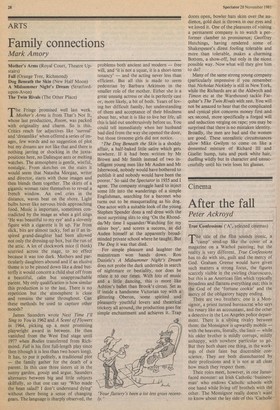ARTS
Family connections
Mark Amory
Mother's Arms (Royal Court, Theatre Upstairs) Fall (Orange Tree, Richmond)
Dog Beneath the Skin (New Half Moon) A Midsummer Night's Dream (Stratfordupon-Avon) The Twin Rivals (The Other Place)
rr he Fringe Promised well last week.
Mother's Arms is from That's Not It, whose last production, Room, was packed with originality and charm. So is this. Critics reach for adjectives like 'surreal' and 'dreamlike' when offered a series of images, few words and no suggestion of plot but my dreams are not like that and there is nothing jarring or shocking in the juxtapositions here, no Daliesque ants or melting watches. The atmosphere is gentle, wistful, nostalgic. From sketches on the stairs it would seem that Natasha Morgan, writer and director, starts with those images and then blends them together. The skirts of a gigantic woman raise themselves to reveal a french window. An owl cries in the distance, waves beat on the shore. Light bulbs hover like nervous birds approaching food. Music is important, sometimes contradicted by the image as when a girl sings 'He was beautiful to my eye' and a slovenly figure with a cigarette is lit up. Far from slick, bits are almost tacky, feel as if an inspired grand-daughter had been allowed not only the dressing-up box, but the run of the attic. A lot of clockwork mice (I think) scurried across the stage, to no effect because it was too dark. Mothers and particularly daughters abound and if an elusive theme is to be pinned down like a dead butterfly it would concern a child shut off from a beautiful, calm but unapproachable parent. My only qualification is how similar this production is to the last. There is no repetition but the atmosphere is close and remains the same throughout. Can these methods be used to capture other moods?
James Saunders wrote Next Time I'll Sing to You in 1962 and A Scent of Flowers in 1964, picking up a most promising playwright award in between. He then vanished from the West End stage until 1977 when Bodies transferred from Richmond. Fall is his first full-length play since then (though it is less than two hours long). It has, to put it politely, a traditional plot — the family gather for the death of a parent. In this case three sisters sit in the sunny garden, gossip and argue. Saunders alternates between big and little subjects skilfully, so that one can say 'Who made the bean salad? I don't understand dying' without there being a sense of changing gears. The language is sharply observed, the
problems both ancient and modern — free will, and 'it is not a squat, it is a short-term tenancy' — and the acting never less than efficient. But all this is made to seem pedestrian by Barbara Atkinson in the smaller role of the mother. Either she is a great unsung actress or she is perfectly cast or, more likely, a bit of both. Years of loving her difficult family, her understanding of them and acceptance of their blindness about her, what it is like to live her life, all this is laid out unobtrusively before us. You could tell immediately when her husband had died from the way she opened the door, but those tiresome girls did not notice.
'The Dog Beneath the Skin is a shoddy affair, a half-baked little satire which gets nowhere. If it had been written by Mr Brown and Mr Smith instead of two intelligent young men like Mr Auden and Mr Isherwood, nobody would have bothered to publish it and nobody would have been the poorer.' So said the Spectator in 1935 and! agree. The company struggle hard to inject some life into the wanderings of a simple Englishman, searching for a baronet who turns out to be masquerading as his dog. One actor with a suitable look of the young Stephen Spender dons a red dress with the most surprising slits to sing 'On the Rhondda/My time I squander/Watching for my miner boy', and scores a success, as did Auden himself at the apparently broadminded private school where he taught. But The Dog it was that died.
For simple pleasure and laughter the mainstream won hands down. Ron Daniels's A Midsummer Night's Dream does not probe the dark underside in search of nightmare or bestiality, nor does he relate it to our times. With lots of music and a little dancing, this is more like Ashton's ballet than Brook's circus. Set as if inside a handsome Victorian toy with a glittering Oberon, some spirited and pleasantly youthful lovers and theatrical trickery all around, the production goes for simple enchantment and achieves it. Trap
doors open, bowler hats skim over the audience, gold dust is thrown in our eyes and we loved it. One of the pleasures of visiting a permanent company is to watch a performer clamber to prominence; Geoffrey Hutchings, having rendered some of Shakespeare's direst fooling tolerable and more than tolerable, makes a charming Bottom, a show-off, but only in the nicest possible way. Now what will they give him to do?
Many of the same strong young company (particularly impressive if you remember that Nicholas Nickleby is still in New York, while the Richards are at the Aldwych and Timon etc at the Warehouse) tackle Farquhar's The Twin Rivals with zest. You will not be amazed to hear that the complicated and cynical plot concerns money first and sex second, more specifically a forged will and seduction verging on rape; you may be surprised that there is no mistaken identity. Broadly, the men are bad and the women are good. These unrealistic circumstances allow Mike Gwilym to come on like a demented mixture of Richard III and Giselle: hump, tutu and punk white hair, duelling wildly but in character and unsuccessfully until his twin loses his glasses.














































 Previous page
Previous page